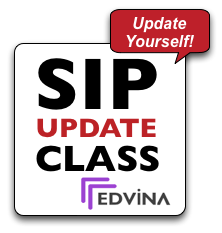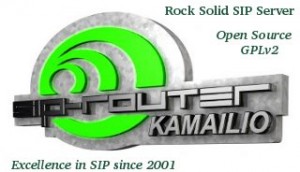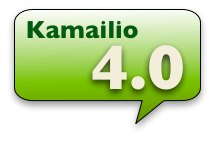SIP update with Kamailio Labs – Update yourself!
 Time to update yourself on SIP and Kamailio!
Time to update yourself on SIP and Kamailio!
If you’ve been using OpenSER, SER or Kamailio for a long time without updating yourself on the new features, it’s about time you update yourself. In this 3-day class, you get an update on new features in Kamailio, time to lab together with other SIP engineers and learn about new features in SIP. Register today for your SIP update!
First class: Stockholm, Sweden, March 6-8 2013!
This class is built for persons that have used Kamailio, SER or OpenSER together with PBX-class tools like Asterisk, Yate and FreeSwitch and wants to learn more about the new features in Kamailio 4.0 and SIP. Kamailio 4.0 is the result of the merger between SIP Express Router and OpenSER. New features have been added in both version 3 and in version 4, to be released during Q1 2013. We will investigate them and do some simple labs to understand how to use these features in your platform.
The class assumes you have base knowledge about SIP and the Kamailio family of SIP servers – SER, OpenSER or Kamailio.
Get an UPDATE this spring!
This class is for current users of Kamailio that wants to learn how to build modern SIP platforms using the latest features in Kamailio – the Open Source SIP server. The class interactively goes through new features in SIP and Kamailio, building a lab platform step by step. When you leave the class, you should know much more about how SIP works today and how Kamailio can scale your existing solution or be the new platform for a Unified Communication network.
- SIP Outbound
- SIP GIN – PBX registration
- SIP identity
- Kamailio – the SIP server
- Kamailio messaging and presence
- Kamailio background processing – async and timer
- 3rd party interfaces – MI and RPC
- Kamailio scripting
- The routing blocks – reply, failure, onsend, event_routes and more
- SIP load balancing and failover, DNS
- Introduction to WebRTC
- SIP security: TLS, S/MIME, SRTP, SIP identity

Learning SIP – the Session Initiation Protocol
What is Kamailio?
 Kamailio (formerly OpenSER), now at release v3.3, soon 4.0, is an open source SIP server, awarded Best of Open Source Networking Software 2009 by InfoWorld magazine, used world wide in VoIP platforms servicing millions of active subscribers and routing billions of call minutes per month.
Kamailio (formerly OpenSER), now at release v3.3, soon 4.0, is an open source SIP server, awarded Best of Open Source Networking Software 2009 by InfoWorld magazine, used world wide in VoIP platforms servicing millions of active subscribers and routing billions of call minutes per month.
 Kamailio is used on all kinds of devices in many different solutions. It’s a very flexible SIP server used as a proxy, presence server, application server, session border controller and much more. It’s based on SIP express router, the first Open Source SIP proxy and is part of the SIP-Router.org project. Kamailio has a large dedicated development team and is used in many enterprises and carriers. FCCN, the Portuguese University Network, operates Kamailio in over 50 universities. 1und1 in Germany has a Kamailio-based VoIP platform with millions of users.
Kamailio is used on all kinds of devices in many different solutions. It’s a very flexible SIP server used as a proxy, presence server, application server, session border controller and much more. It’s based on SIP express router, the first Open Source SIP proxy and is part of the SIP-Router.org project. Kamailio has a large dedicated development team and is used in many enterprises and carriers. FCCN, the Portuguese University Network, operates Kamailio in over 50 universities. 1und1 in Germany has a Kamailio-based VoIP platform with millions of users.
In this class, you will learn the basics of Kamailio and get a platform to build from when designing your future SIP Unified Communication solution. The class covers many aspects of Kamailio, from basic call handling to presence and security.
Who is this class for?
The course targets system administrators and people that work with large VoIP/telephony network services, as well as integrators of VoIP, instant messaging and presence with web 2.0 or similar technologies. Some experience of Kamailio and SIP is required, as we start from a basic understanding of how a SIP server like Kamailio works.
What you need to know beforehand
You need to have experience of operating SER/OpenSER or Kamailio and either Asterisk or FreeSwitch with SIP phones, building corporate or service-provider solutions. You need to know how to compile, install and configure these applications in Linux.
What makes this class unique?
 The class is based on years of experience – not only from training, but also from actually implementing Kamailio and Asterisk in all kinds of networks, from service providers and enterprises to call centers and various applications
The class is based on years of experience – not only from training, but also from actually implementing Kamailio and Asterisk in all kinds of networks, from service providers and enterprises to call centers and various applications- You will learn from a developer that knows the applications inside out
- Interactivity – the class mixes classical teaching with labs in an interactive way
- Standards based – the SIP sessions are not unique or special for Asterisk, FreeSwitch or Kamailio – they’re applicable to all SIP devices
- In-depth-security – the class covers the SIP security standards and discusses the implementations in Kamailio, FreeSwitch and Asterisk
Learn from the SIP master: Olle E. Johansson
Olle has been teaching network classes for many years. He wrote the first Asterisk Bootcamp and created the DCAP certification for Asterisk. Olle is also a co-founder of the Astricon conferences, now operated by Digium. During 2006-2012 he ran a class called “the Asterisk SIP Masterclass” that started from the Bootcamp and introduced the SIP protocol and Kamailio. This class builds on experiences from all those trainings. Olle is an experienced teacher and consultant, as well as an Asterisk developer and member of the Kamailio developer team. Olle focuses on the SIP protocols and have over 10 years of experience of building large scale platforms with Open Source tools.
Details about this training
- Dates: March 6-8, 2013
- Price: 1.500 EURO, payment in advance by bank wire (You will get an invoice with instructions)
The price includes training documentation, lunch and refreshments.
For students within the European Union, Swedish VAT is added. This can be reclaimed locally, by contacting your local tax office.
We do not give refunds on late cancellations or no-shows. Cancellation has to be sent to us at least one week in advance. - Times: The training starts at 10 AM the first day, ends 4 PM on the last day, other days from 9am to 5pm.
- Location: Electrum, Kista
- Each student needs to bring a laptop that can operate a Linux virtual machine and optionally SIP equipment to the training. Make sure that all equipment is insured by you or your company. Edvina will bring a network infrastructure and SIP phones for each student.
Register via e-mail to info@edvina.net today!
